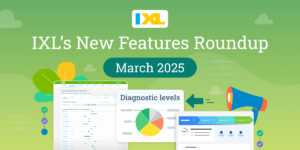At IXL, we never stop adding new features and skills to our award-winning teaching and learning platform, so you can always trust we’re on pace with students’ evolving needs. That’s why we compile a list of our top new features to help you—as a learner, educator, or parent—get the most out of IXL.
Keep reading below for a roundup of releases from March, including name updates to IXL’s diagnostics, Item Analysis reports for Common Assessments and Quiz Library, current data for IXL LevelUp™ reports, and more! To stay current with our latest updates, follow IXL on Facebook, Instagram, X, and LinkedIn.
Table of contents:
- Major releases
- Feature updates
- Name updates to IXL’s diagnostics
- View real-time data in IXL LevelUp™ reports
- Question and standards analysis in Quiz Analysis report
- Group Jams from Diagnostic Strand Analysis reports
- Maximum LevelUp Diagnostic score increased to 1200
- Calculator added to select LevelUp Diagnostic questions
- Translation support expanded to 90 languages
- Multi-language support for iPad and iPhone
- Popular content on child account dashboards
- Parent accounts can create personalized study plans
- Bulk printing for Student Quiz Results report
- New spring themes for the student dashboard
- Skill plan updates and new skills
- Additional releases
Major releases
Item Analysis reports for Common Assessments and Quiz Library Resources
School and district administrators can now gain deeper insights into their Common Assessments and Quiz Library Resources through the new Common Assessment Item Analysis and Quiz Resource Item Analysis reports!
These reports enable admins to drill down into individual questions and standards on custom assessments. For each standard, they can view the number of associated questions, average student results, and individual student performance. Admins can also see students’ exact responses, allowing them to surface insights about common incorrect answers.
Note that to see analysis by standard on these reports, the creator of an assessment must select questions from a standards skill plan under the “District spotlight” section while they’re making it.
The Item Analysis reports are available to administrators with IXL Analytics access in all English-language editions. Analysis by standard is available for administrators in the U.S., Canada, U.K., and Australia.
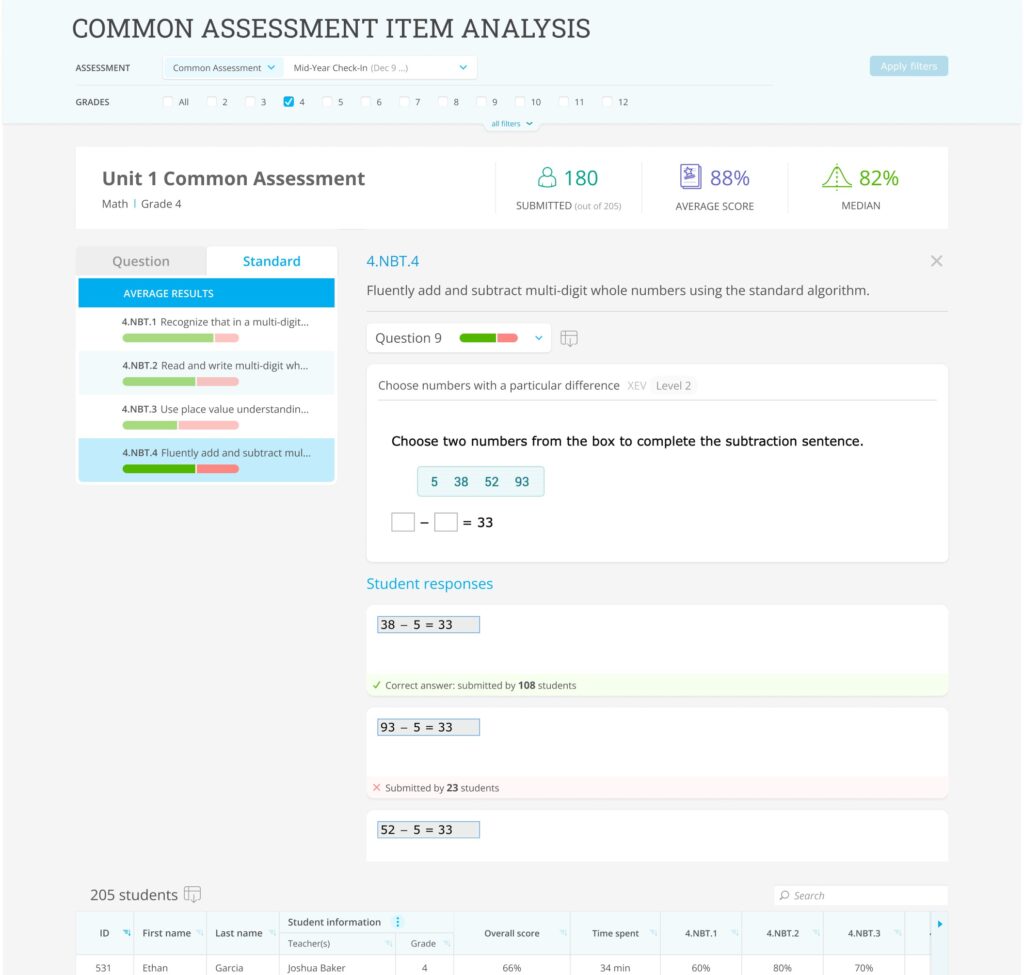
Feature updates
Name updates to IXL’s diagnostics
We’ve updated the names of our two IXL Diagnostics to provide more clarity and better reflect their flexibility. Introducing:
- The IXL LevelUp™ Diagnostic (previously the IXL LevelUp Math Benchmark Assessment)
- The IXL Flex Diagnostic (previously the IXL Classic Diagnostic or IXL Real-Time Diagnostic)
With these two powerful options, IXL ensures you have the precise data you need to drive student success. Both of these diagnostics come in Real-Time and Benchmark modes. Additionally, all reports for these diagnostics have been updated to reflect the new names.
For the IXL Flex Diagnostic in Real-Time mode and Benchmark mode, non-U.S. and family accounts will still see the “IXL Real-Time Diagnostic” and “Diagnostic Snapshot” names.
View real-time data in LevelUp™ reports
The LevelUp Diagnostic Results and LevelUp Standards Performance reports for administrators will now include students’ most recent scores from the past 60 days, in addition to LevelUp Benchmark data. Admins can also compare recent scores against a past Benchmark window. By displaying the latest student data, LevelUp Diagnostic reports are more actionable for administrators.
Question and standards analysis in teacher Quiz Analysis report
Teachers can now use the Quiz Analysis report to see student performance at the question and standard level on Common Assessments and Quiz Library Resources.
Using the “Student responses” tab, teachers can identify common incorrect answers to tailor their reteaching strategies. If the Common Assessment or Quiz Library Resource is associated with state standards, teachers can also group quiz results by individual standards to assess proficiency on key learning objectives. These new insights help teachers make even more data-driven instructional decisions in the classroom!
Analysis by question is available for teachers in all English-language editions, while analysis by standard is available for teachers in the U.S., Canada, U.K., and Australia.
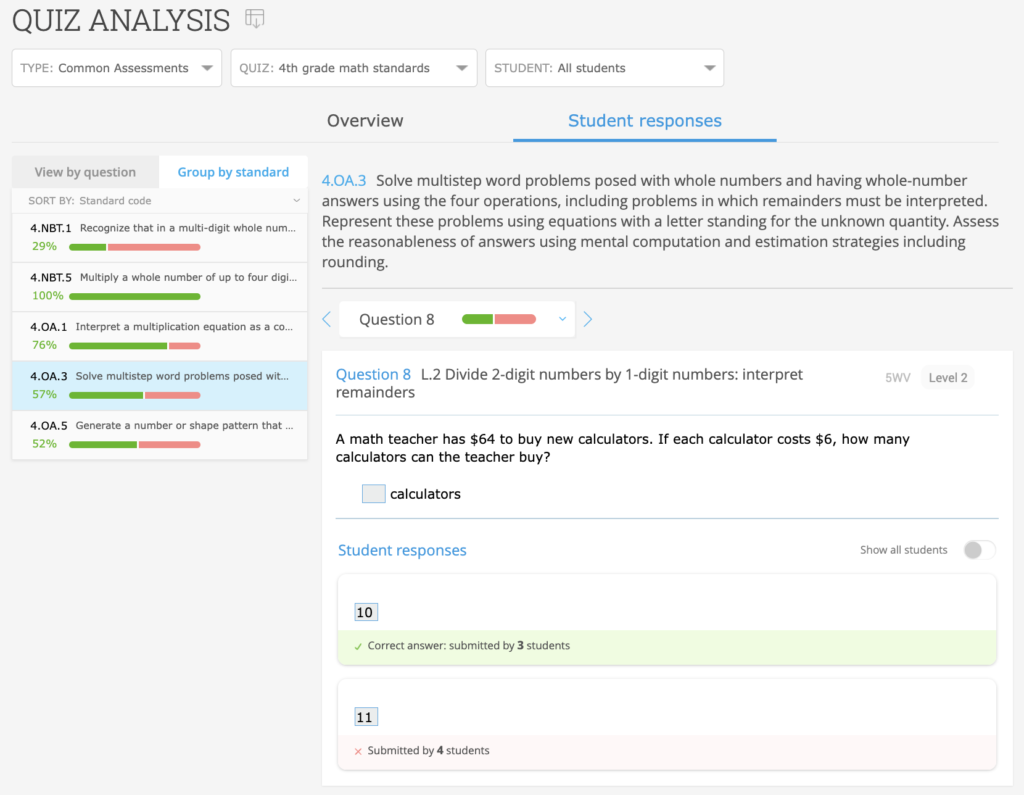
Launch Group Jams from the LevelUp and Flex Diagnostic Strand Analysis reports
Teachers can now set up Group Jams directly from the Flex and LevelUp Diagnostic Strand Analysis reports! These reports group students based on similar strand scores and provide skill recommendations for small-group instruction.
This change makes the Strand Analysis reports more actionable, and adds a shortcut for teachers who want to work more efficiently.
Next to each small group, teachers can now select a button that takes them to the Group Jam setup page with students and skills preselected based on the report’s recommendations. They can review and adjust the selections before starting the Group Jam.
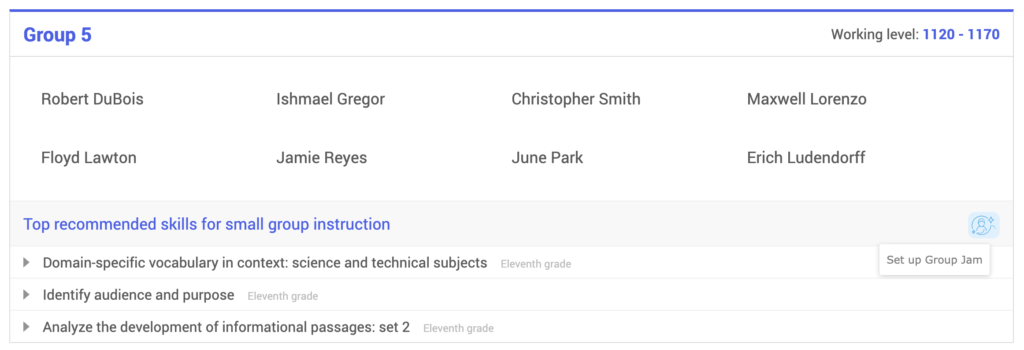
Maximum LevelUp Diagnostic score increased to 1200
Students taking the LevelUp Diagnostic are now able to receive high school-level math questions and achieve scores up to 1200. Previously, the maximum LevelUp score was 920.
This ensures high-performing students can get detailed scores, track their growth, and challenge themselves with recommendations suited to their level.
Calculator added to select LevelUp Diagnostic questions
IXL’s built-in calculator is now available on LevelUp Diagnostic questions. The calculator will appear on select middle- and high-school-level math questions where calculator use is appropriate, helping students stay focused on IXL assessments while better preparing them for state tests.
Depending on the question, students will see either a four-function calculator or a scientific calculator. They can toggle the calculator by clicking on the icon on the right side of the arena, underneath the Scratchpad’s pencil icon.
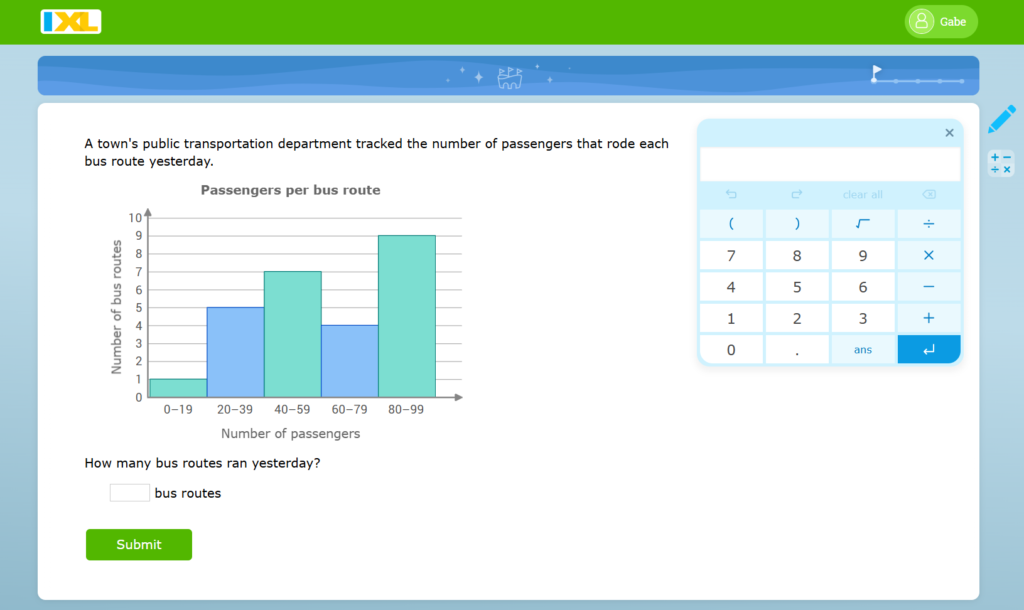
Translation support expanded to 90 languages
IXL now provides comprehensive language support for 90 languages, enabling all students to make progress in essential skills, even if they are still building their English language abilities.
We recently added support for additional languages:
- Hungarian: Part of the Uralic language family, spoken in Hungary and parts of neighboring countries such as Romania, Slovakia, and Serbia.
- Kurdish (Kurmanji and Sorani): Part of the Kurdish group of languages, spoken in parts of Turkey, Iran, Iraq, and Syria.
- Oromo: Spoken by more than 30 million people in Ethiopia, Kenya, and other East African communities.
Multi-language support for iPad and iPhone apps
We’ve brought our translation support for 90+ languages to the IXL iPad and iPhone apps! Now students can practice IXL skills on iOS mobile devices in their preferred language, supporting their academic growth while they are acquiring their English language skills.
Popular content on child account dashboards
For children on IXL family accounts, dashboards now have a new section that highlights content that is currently popular on IXL! The section highlights popular skills, games, and videos for the child’s grade level, as well as content from IXL’s Weekly Boost skill plans relevant for the current time of year. This gives learners a new way to discover exciting educational material.
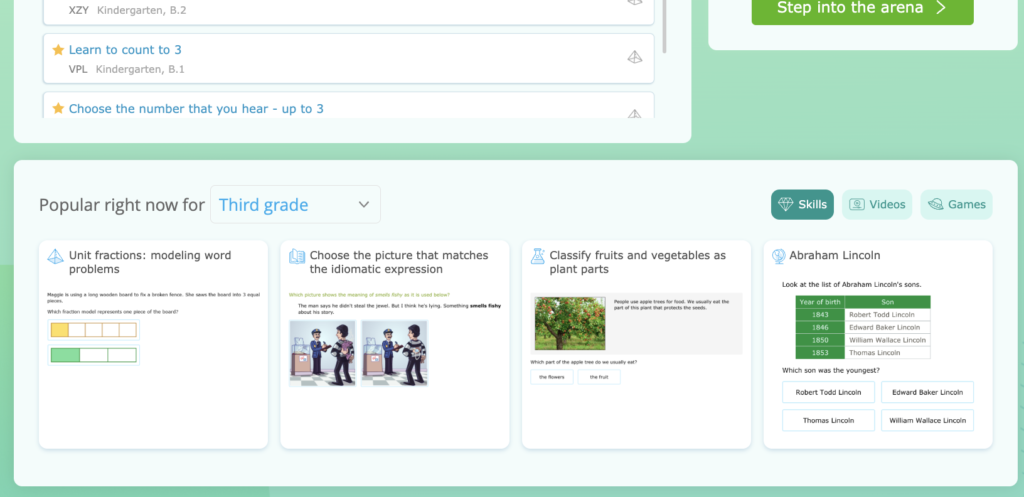
Parent accounts can create personalized study plans for the SAT, ACT, and PreACT
Parent accounts on IXL family subscriptions can now use their children’s SAT, ACT, and PreACT scores to create personalized plans with IXL’s StudyWise tool. These plans guide IXLers to the skills that will help them raise their scores the most, so this change makes it easier for parents and guardians to take an active role in their children’s education.
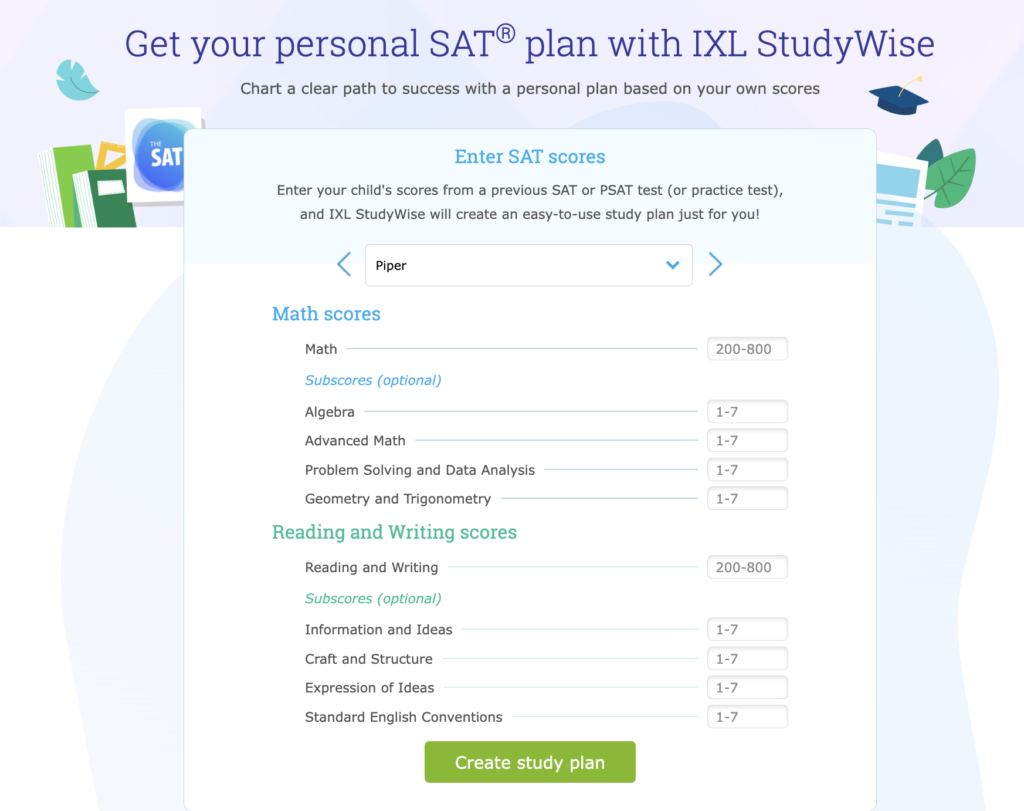
Bulk printing for Student Quiz Results report
Teachers can now print the Student Quiz Results report for all of their students at once. Printing this report is useful for sharing quiz results with students and parents, as well as for creating practice worksheets for students to review and retake questions they missed.
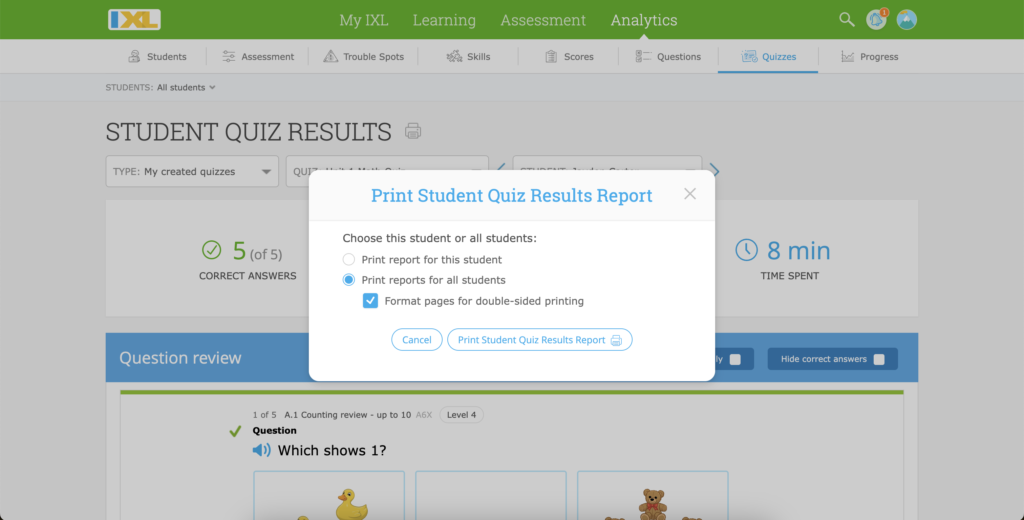
New spring themes for the student dashboard
Students can customize their dashboards with two new seasonal themes for spring: Garden and Picnic! Each year, these themes will be available from March to May for child users in all English-language editions of IXL (except in Australia, New Zealand, and South Africa, where they’ll be available from September to November).

Skill plan updates and new skills
New math skills
We’ve released over a dozen new math skills, from kindergarten to Calculus:
- Make picture graphs (Kindergarten)
- Count pictures in arrays and circles – up to 20 (Kindergarten)
- Greater than, less than, or equal to – compare by counting up to 10 (Kindergarten)
- Count pictures and show a number that is greater, less, or equal – up to 10 (Kindergarten)
- Use place value to add numbers up to two digits (Grade 1)
- Count forward by ones and tens – up to 120 (Grade 1)
- Add numbers up to two digits (Grade 1)
- Interpret data in tables (Grade 2)
- Use expanded form to subtract three-digit numbers (Grade 2)
- Read a scale – metric units (Grade 3)
- Multiplication and division: real-world patterns (Grade 3)
- Multi-step measurement problems with conversions (Grade 4)
- Add and subtract fractions with like denominators: multi-step word problems (Grade 4)
- Add and subtract fractions and mixed numbers with like denominators: multi-step word problems (Grade 4)
- Find indefinite integrals using substitution (Calculus)
- Integrate using long division (Calculus)
New ELA skills
We’ve released 26 new ‘Learn the Letter‘ skills for Pre-K and Kindergarten! Each skill is dedicated to learning one letter of the alphabet, helping students recognize and name both uppercase and lowercase letters. These engaging skills provide our youngest learners with a strong introduction to letters, supporting their early literacy development.
We’ve also added two new decodable text skills, one each for first grade and second grade, focused on the vowel team patterns. Like our other decodable stories, Read vowel team stories includes delightful illustrations along with engaging stories to help build foundational reading skills. Look out for more decodable texts coming soon!
New science skills
We’ve released a few new science skills:
- Magnetic forces and fields (Grades 6-8): With the aid of helpful diagrams, students learn that field lines form loops that point away from the north pole of a magnet and toward the south pole. They also explore how magnetic fields from two magnets interact depending on the orientation of the magnets.
- Classify and describe organisms using domains (Biology): Students apply classification criteria to classify organisms into the three domains of life: Archaea, Bacteria, and Eukarya.
- Sexual reproduction and genetic variation: part 1 (Biology): Students learn about the difference between sexual and asexual reproduction, the process of fertilization, and the types of cells involved in sexual reproduction.
New social studies skills
We’ve released five new social studies skills:
- Thurgood Marshall, Amelia Earhart, and Abraham Lincoln (K-3): Students learn about the lives and accomplishments of these key historical figures. The skills feature engaging read-along highlighting to support emerging readers.
- Region profile: the Southwest (Grades 4-5): Students learn about the states that make up the Southwest region of the United States. They’ll use engaging maps and photographs to explore the region’s geography, climate, and economic industries.
- Methods of Payment (Grades 6-8): Students develop their financial literacy knowledge as they compare the pros and cons of cash, checks, credit cards, and debit cards.
New textbook skill plans
We’ve released skill plans for the following textbooks:
Math:
- Oxford Primary Years Programme (US grades PK-K)
- Experience Math (Grades K and 3-5)
- Oxford Middle Years Programme (US grades 6-10)
- Georgia Mathematics Instructional Resources (Grades 6-8, Enhanced Algebra, Algebra, and Geometry)
ELA:
- Bluebonnet Learning (Texas) (Grades K-2)
- myView Literacy 2025 (Grades K-5)
- Being a Writer (Grades 2-5)
New standards skill plans
We’ve released skill plans for the following standards:
- Maryland College and Career Ready Standards (Statistics, Precalc A/B)
We’ve also released high school U.S. History standards skill plans for 15 states:
- Alabama
- Colorado
- Connecticut
- Indiana
- Kentucky
- Louisiana
- Maryland
- Massachusetts
- Minnesota
- Missouri
- New Jersey
- Oklahoma
- Oregon
- South Carolina
- Washington
New test prep skill plans
We’ve released skill plans for the following assessments:
- Idaho Standards Achievement Tests (ISAT) (Math and ELA grades 3-8 and 11, science grades 5 and 8)
- New Jersey Student Learning Assessment (NJSLA) (Science grades 5 and 8)
- Rhode Island Comprehensive Assessment System (RICAS) (Math and ELA grades 3-8)
- Rhode Island Next Generation Science Assessment (NGSA) (Science grades 5 and 8)
Additional releases
New math and ELA video tutorials
We’ve released 45 new math videos in Kindergarten through Calculus to expand our coverage! These videos cover topics such as three-dimensional shapes and finding extrema.
Additionally, we’ve added Spanish subtitles to 62 more math videos. Like translated skills, translated subtitles are available to users with Spanish support enabled.
We’ve also released 19 new ELA videos in Grades 3-5! The videos in this release cover topics such as revising a sentence with a stronger verb and reading fantasy with illustrations.
Expanded Spanish support for Takeoff by IXL
We’ve released Spanish translation support for 15 additional Takeoff units!
Kindergarten – Units 10 and 11
Grade 1 – Units 10-12
Grade 4 – Unit 15
These units now have Spanish translations available for the student workbook PDFs, independent practice PDFs, mid-unit check-in, and unit test.
NIMAS files for Takeoff
NIMAS files are now available for Takeoff PDFs in grades 2-5! NIMAS (National Instructional Materials Accessibility Standard) is a file format that facilitates the conversion of print materials into various accessible formats, including braille, large print, digital audio, and digital text.
NIMAS files are available for all Takeoff print materials in grades 2-5, including student workbook PDFs, independent practice PDFs, quizzes, tests, games, and extras. Authorized users can access these files through the National Instructional Materials Access Center, or NIMAC.
New math skills for Canada, the UK, and Australia
We’ve released new math skills for our Canadian, Australian, and UK editions! In the Calculus skill Fundamental Theorem of Calculus, Part 2, students use the Fundamental Theorem of Calculus to solve problems involving different numerical and visual representations of functions. Together with Part 1, these skills comprehensively cover this important Calculus topic.
We have also released skills that cover measuring volumes of liquids, the spatial relationship between objects that are in front of or behind each other, and justifying whether two geometric figures are similar.
New science skills for Canada, the UK, and Australia
We’ve released new science skills for our Canadian, Australian, and UK editions!
- Severe weather: hurricanes (CA grade 1)
- Conductors and insulators (UK year 4-6, AU year 5-6)
